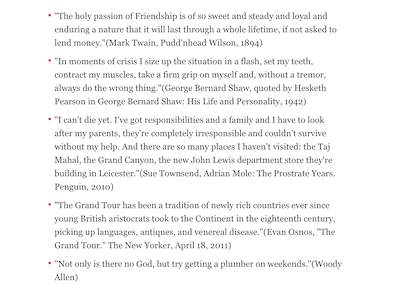Figure of speech. Outside the newspaper offices,
Bloom hears a newsboy screaming out an announcement: "Terrible
tragedy in Rathmines! A child bit by a bellows!" Joyce here
repeats an Irish newspaper article's fanciful example of the
absurdly sensational headlines occasionally concocted by
newsboys. He also makes use, here and elsewhere, of the
rhetorical device called anticlimax, a sudden descent
from serious, important words to comically insignificant ones.
Anticlimax always
denotes a decline from some kind of high point to something
relatively inconsequential (Greek
anti- = opposite +
klimax
= ladder, so "down the ladder"), but it is most commonly
associated with actions. In rhetorical theory, however, the term
refers to a sudden shift from high to low
language. In
his webpage on the device, Richard Nordquist
(thoughtco.com/what-is-anticlimax-rhetoric-1689102) offers many
examples of its potential for comic deflation.
Robert
Seidman notes that the trope is used when Myles Crawford
insists that a good newspaper article should "Give them
something with a bite in it. Put us all into it, damn its soul.
Father, Son and Holy Ghost and Jakes M'Carthy." Naming a
sports
reporter after invoking the Holy Trinity, Seidman
observes, "instead of heightening the effect that has been
building up, suddenly lowers it or makes it ludicrous." He also
affirms
Stuart
Gilbert's observation that following "
Terrible tragedy"
with the story of "
A child bit by a bellows!" is
anticlimactic.
In a JJON essay, John Simpson quotes from a 16
January 1908 article about Dublin newsboys in the Irish
Independent in which the writer notes that the
typical newsboy does not trumpet stories in the papers he is
selling. "Sometimes, however, in a fit of wild exuberance he
manufactures such startling imaginary news that even the
yellowest of yellow journals would hesitate before owning it."
The writer offers two examples: "Could anything be more
sensational than 'Horrible accident in Rathmines - Child
bit by a bellows', or 'Shocking railway accident - Train
runs into a station'?" Joyce apparently held on to the
first example and found an opportunity to use it in his
newspaper chapter. In Circe the sensationally hyped
language returns, but now anticlimax is followed by hyperbolic
exaggeration as a chorus of newsboys yells, "Stop press
edition. Result of the rockinghorse races. Sea serpent in
the royal canal. Safe arrival of Antichrist."

